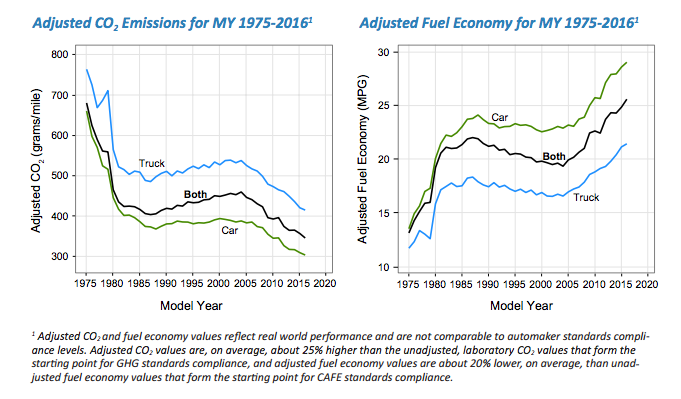President Donald Trump took a step toward repealing a set of Obama-era vehicle fuel-efficiency rules aimed at curbing global warming, announcing a formal review onstage alongside several automaker executives at a rally in Detroit on Tuesday.The administration is looking to roll back federal regulations that would have forced automakers to meet new environment-friendly standards.“These standards are costly for automakers and the American people,” EPA Administrator Scott Pruitt said in a statement. “We will work with our partners at DOT to take a fresh look to determine if this approach is realistic.The EPA regulations, known as the Tailpipes Rule, were one of the Obama administration’s final acts aimed at protecting the environment.The regulations were seemingly locked in by the Obama administration on Jan. 12, a week before Inauguration Day, when then–EPA head Gina McCarthy took the unprecedented move of issuing a final determination months before the agency’s April 2018 deadline.The resulting regulations, known as the light-duty vehicle greenhouse gas (GHG) emissions standards, were put forth jointly by the EPA and the Transportation Department, and would have required automakers to achieve fuel economies for passenger cars that average 54.5 miles per gallon by 2025 – a huge increase over the then 36 miles-per-gallon standard.Trump has until that April 2018 deadline to propose the new emissions standards, which will require another lengthy rulemaking process and regulatory review by the EPA and Transportation Department.Trump’s announcement – a huge concession to automakers who cite a growing demand for less fuel-efficient vehicles like pickup trucks – developed out of a series of letters and public comments with the Alliance of Automobile Manufacturers, a trade group representing 12 manufacturers including BMW, Ford, GM, Mercedes Benz, VW, and Toyota.In their public comments, AAM complained that the EPA had used flawed models that incorrectly predicted the technology costs associated with the new standards, estimating their total compliance costs could be as much as $200 billion between 2012 and 2025. The group specifically noted that many technologies key to compliance are not currently in production domestically, and concluded that only 3.5 percent of vehicles would achieve the required fuel economy in the prescribed time frame.Under Obama, the EPA had dismissed many of these concerns as vague accusations and faulty calculations, highlighting in an evaluation a “wide range of technology pathways available” that “will save consumers money, significantly reduce GHG emissions and fuel consumption, and provide benefits to the health and welfare of Americans.”According to a 2016 EPA Fuel Economy Trends Report, automakers have been adopting fuel-efficient technologies at unprecedented rates, recording a record low of carbon dioxide auto emissions last year, despite the claims of technology gaps. The Obama administration’s vehicle standards also comprised one of the five major strategies to meet the Paris Agreement reduction commitments, so a rollback on the regulation would leave huge gaps in the United State’s pledge for the global climate treaty.Automakers are also watching to see how Trump’s proposed repeal will affect California’s tailpipe emissions regulations, which other states can adopt in lieu of the federal standards. California is currently able to set its own rules through a waiver it holds from the EPA, and while EPA chief Scott Pruitt did not explicitly address California’s authority at the announcement, the agency is reportedly considering revoking California’s more stringent regulatory scheme.Massachusetts Democratic Sen. Edward Markey says that would backfire for Trump and the automakers, who reportedly pressed Trump to abolish “dueling standards” in a closed-door meeting in January.“The bottom line is attacking the California waiver is a recipe for chaos for the car companies, because those states will not go easily and [the car companies] know it,” Markey said.
The Obama administration’s vehicle standards also comprised one of the five major strategies to meet the Paris Agreement reduction commitments, so a rollback on the regulation would leave huge gaps in the United State’s pledge for the global climate treaty.Automakers are also watching to see how Trump’s proposed repeal will affect California’s tailpipe emissions regulations, which other states can adopt in lieu of the federal standards. California is currently able to set its own rules through a waiver it holds from the EPA, and while EPA chief Scott Pruitt did not explicitly address California’s authority at the announcement, the agency is reportedly considering revoking California’s more stringent regulatory scheme.Massachusetts Democratic Sen. Edward Markey says that would backfire for Trump and the automakers, who reportedly pressed Trump to abolish “dueling standards” in a closed-door meeting in January.“The bottom line is attacking the California waiver is a recipe for chaos for the car companies, because those states will not go easily and [the car companies] know it,” Markey said.
Advertisement
Advertisement
